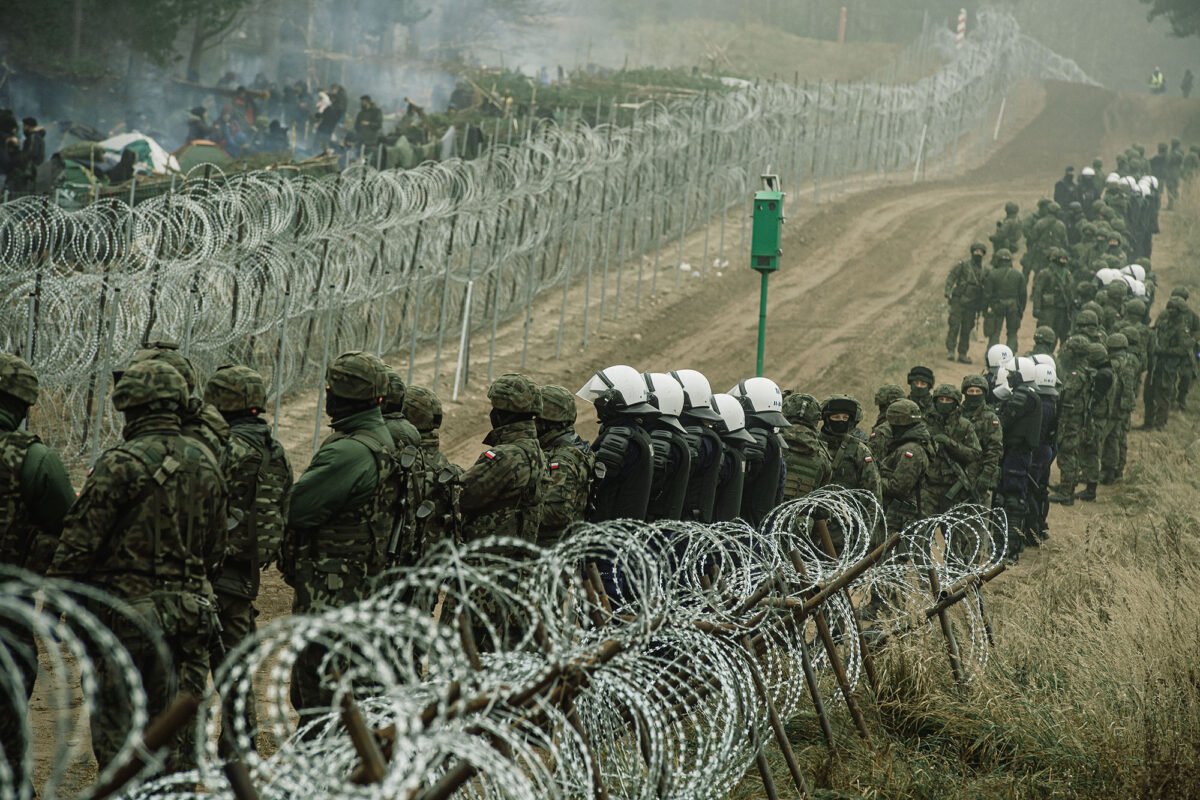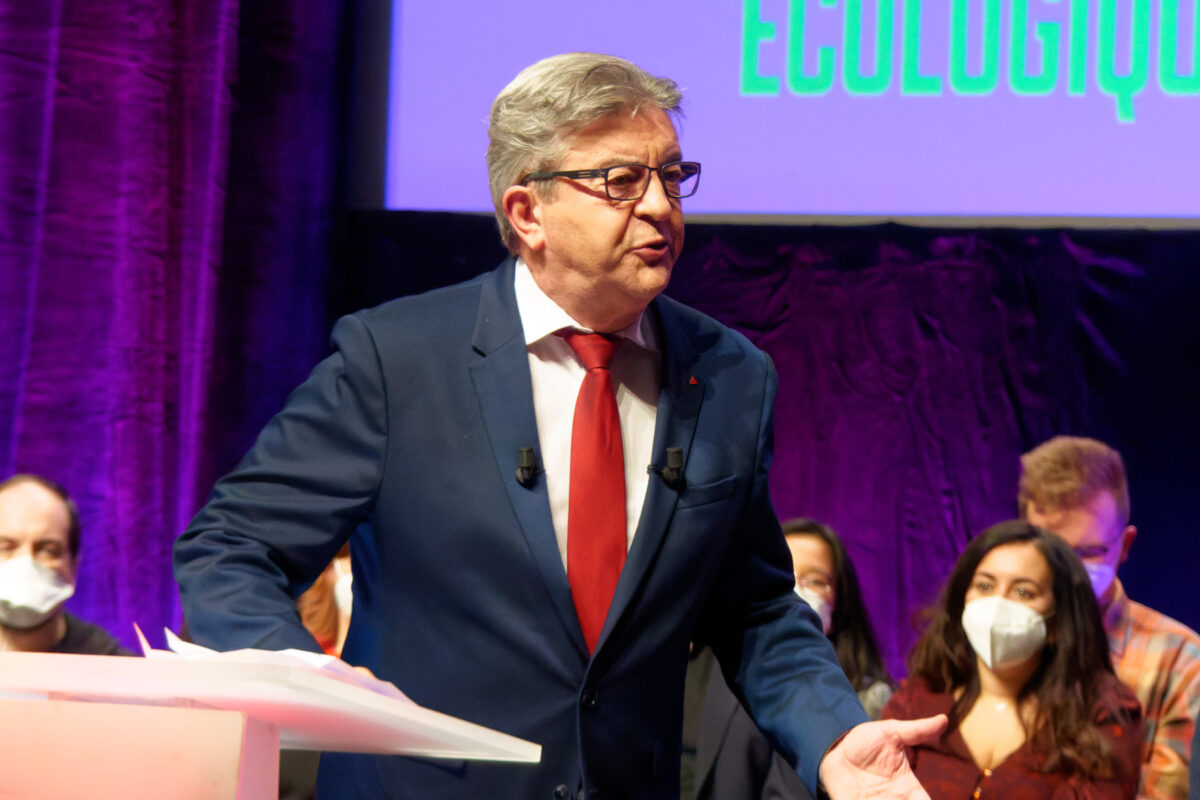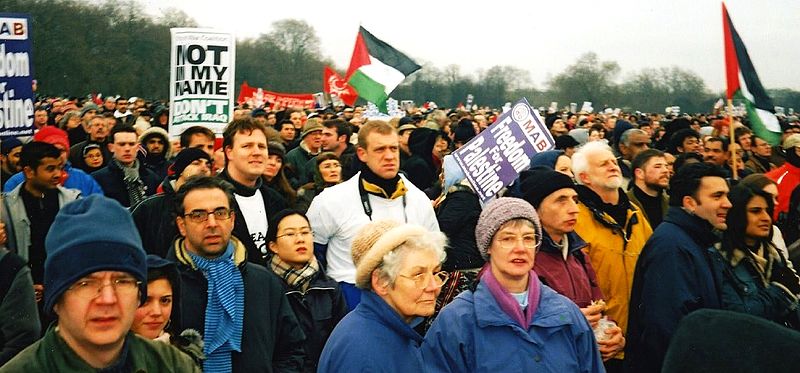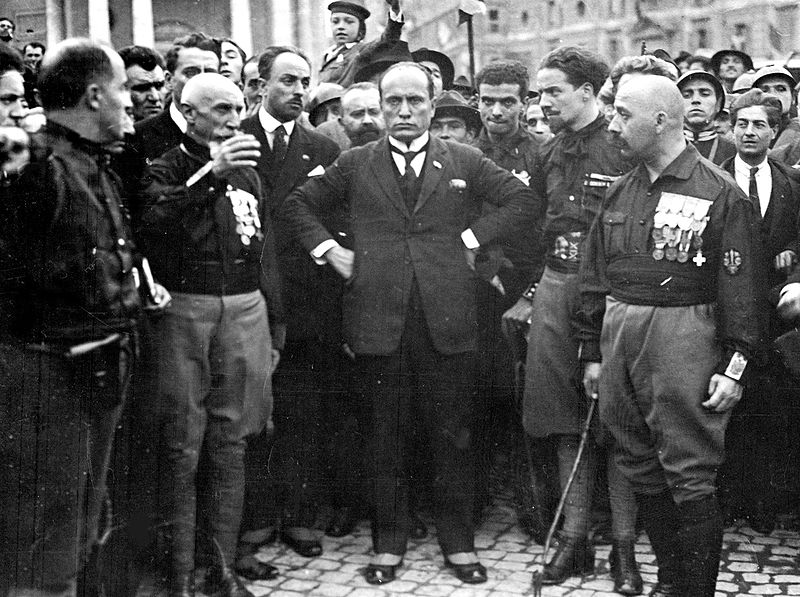The mobilization against Putin’s invasion of Ukraine has been inspiring. Tens of thousands organized in solidarity with a people under attack, collecting donations or organizing the transport of refugees. On Sunday, millions took to the streets to demand an end to war and to Russian imperialism. In Berlin, 100,000 people gathered in the city center to not only protest against the war, but to also demand immediate support for those who have to flee their homes.
A few months ago, in November, I was at a protest with a similar purpose. Also gathering at Pariser Platz and going down Unter den Linden, it was attended by a much lower, though by no means insignificant, number of people. This time it was to demand the immediate opening of EU borders for the intake of the thousands of Middle Eastern refugees whom Belarus had weaponized by forcing them to attempt illegal border crossings. At least 21 migrants died in the cold forests at the Polish border. While Poland is now welcoming all those who are allowed to leave Ukraine (with reports, however, of Africans pushed to the back of the queue at “Ukrainian-first” entry points into Poland), thousands of refugees are still stranded at the Belarussian border, not allowed to enter. Polish plans to build a border wall against migrants in the Białowieża Forest are also still in place and still protested by Polish activists.
Indeed, it is difficult to even find information about them in a media landscape understandingly dominated by the invasion of Ukraine. This is one example of a tension in the left’s response to the crisis in Eastern Europe. Calls for solidarity share space with remarks that conflicts, invasions, and imperialist aggressions outside of Europe have rarely received the same amount of attention and mobilization. These should not be competing narratives. Except for a few campists who support Russian aggression as a response to American imperialism, none would argue against unconditional support for the rights of Ukrainians to defend themselves and to find refuge in other countries. As journalist Vincent Bevins wrote in a viral tweet, “Why does the world care so much about Ukraine?” is a harmful, anti-solidaristic question to ask about the current situation. A better one would be “Why doesn’t the world care more about suffering in places like Yemen and Afghanistan?”
Humanitarian aid… is offered more willingly to those who are perceived to be productive capitalist workers (“middle-class”), to those who might be better assimilated without disturbing existing hierarchies (“like us”), and to those who are not racialized as others (“with blue eyes and blond hair”)
Unfortunately, the reason for this was often made explicit in media coverage of the invasion. Reporters have expressed their astonishment at the fact that war was happening in a “relatively civilized” country on the European continent. Although the US and European states have been direct causes of wars in “uncivilized” countries, Western reporters find it difficult to comprehend that militaristic aggression starts from the core of the so-called developed world. In this worldview, campaigns conducted by Western powers in places such as Iraq, Afghanistan, or Syria are justifiable because they are against “uncivilized” peoples living in uncivilized places. The ideologies covering imperialism and capitalist accumulation have in the past week taken the role of preserving a self-image of a peaceful Europe.
In the case of refugees, this historical and political exceptionalism becomes inscribed on their bodies. It is not only the places that are civilized, but also the people seeking help. They deserve support, it is said, because they are “middle-class” or “like us.” In some cases, the racism is not only implied, but said out loud, with a former deputy prosecutor in Ukraine saying on BBC that the plight of Ukrainian refugees is shocking because they have “blue eyes and blond hair.” The comparison with Middle Eastern refugees is also not just implicit. The Al Jazeera English commentator sympathetic to “middle-class” Ukrainians went on to stress that “these are not, obviously, refugees trying to get away from areas in the Middle East.” Visegrad 24, a Central European news outlet, regularly tweets statements such as “Not all refugees are equal” or, captioning a picture of a Ukrainian woman with children, “This is how real refugees look like.”
It is essential to understand that this does not mean that all coverage of the Ukraine invasion is pure CIA propaganda badly covering up the fascist reality and that Russia is somehow the anti-imperialist hero of the story. Rather, we are now witnessing, in real time and close proximity, the uneven distribution of who is considered worthy of solidarity. Judith Butler wrote about the Iraq war and about the Guantánamo Bay illegal detention center, arguing that the mechanisms of imperial aggression and the ideologies that sustain them make some lives more grievable than others.
Humanitarian aid is predicated on a liberal universalism. An exclusionary universalism that judges all lives according to the Euroamerican standard. The capacity of European states to aid others, to welcome them into the prosperity created by imperial wars and accumulation, is not unconditional. It is offered more willingly to those who are perceived to be productive capitalist workers (“middle-class”), to those who might be better assimilated without disturbing existing hierarchies (“like us”), and to those who are not racialized as others (“with blue eyes and blond hair”). The wealth of the West is only justifiable if people elsewhere, who are different, are disposable.
That is why the Visegrad 24 Twitter account can tout the humanitarian hospitality of Poland, while arguing that the country has the right to defend its borders against the refugees pushed through Belarus. Some lives are considered to deserve being saved less than others, and some people are considered to deserve being here less than others. Saying this without weakening our claims to solidarity with the Ukrainian people may be a difficult rhetorical task. But we should not give up on saying it. As we should not ignore the outrageous increase in German military funding (which also caused the stocks of German arms manufacturer Rheinmetall to go up 40% on Monday), even though we encourage support for Ukrainian defense efforts. As we should not ignore the violently Islamophobic video of Azov Battalion soldiers shared by the official Twitter account of the Ukrainian National Guard, even though we find Putin’s claims to “denazify” Ukraine to be themselves merely fascist pretenses.
There is no contradiction in acknowledging, at the same time, that there is rampant racism in Eastern Europe manifesting in the differential admission of refugees. That the Ukrainian people are the victims of imperialist aggression and deserve our unreserved support and help. We should care about Ukraine, and we should care about the Ukrainian people. If now is not the right time to question hypocrisy, when is? We should also take this chance to question why we have cared less about the suffering of others.




